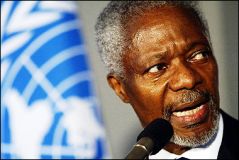Annan makes last push for Darfur deal
Dec 19, 2006 (UNITED NATIONS) — Kofi Annan used his last press conference to defend his 10-year stewardship of the United Nations and to make one last push to end the tragedy in Sudan’s Darfur region.
 Facing off with the UN press corps for the last time before he steps down on December 31, the 68-year-old Ghanaian, fielded questions with aplomb, including from critics of his record, and said his worst moments were associated with the 2003 US-led war in Iraq.
Facing off with the UN press corps for the last time before he steps down on December 31, the 68-year-old Ghanaian, fielded questions with aplomb, including from critics of his record, and said his worst moments were associated with the 2003 US-led war in Iraq.
“I’m particularly anxious that there be no break in our handling of the continuing crisis in Darfur,” he said.
Monday, he announced the dispatch of senior adviser Ahmadou Ould Abdallah to Khartoum to clarify Sudanese President Omar al-Beshir’s stance on plans to turn the underfunded and ill-equipped African Union (AU) peacekeeping force in strife-torn Darfur into a “hybrid” AU-UN force.
He also named Swedish former foreign minister Jan Elliason as interim special representative to Sudan.
Eliasson, a former president of the UN General Assembly, “will work the diplomatic channels mainly outside Sudan, working with capitals and governments and encouraging them to stay engaged and work with us in Darfur in the search for a solution,” Annan said Tuesday.
At least 200,000 people have died and 2.5 million been displaced in Darfur as a result of the combined effects of war and famine, according to UN figures.
“I’m still hopeful that in the new year there will be a (UN) force on the ground to bring effective protection and security to the suffering people of Darfur,” Annan said.
The world’s top diplomat said his worst moments involved his failure to prevent the Iraq war, the deaths of 22 UN staffers in Baghdad, including special envoy Sergio Vieira de Mello of Brazil, in a Baghdad attack in August 2003 and the way the oil-for food corruption scandal “was exploited to undermine the organization.”
On the oil-for-food scandal, he conceded that there was “some mismanagement” in the humanitarian scheme for Iraq.
“There may have been several UN staff members who were engaged. But the scandal if any was in the capitals and with the 2,200 companies that made a deal with (Iraqi leader) Saddam (Hussein) behind our backs.”
The Iraq war “had lessons for everybody,” he noted. “But regardless of where one stood in that debate, it is important that we find a way to stabilize Iraq.”
Among his proudest achievements, Annan cited the promotion of human rights and the approval by UN member states last year of the concept of “Responsibility to Protect” people faced with genocide, war crimes and crimes against humanity.
He also pointed to the poverty-reduction Millenium Development Goals and the UN work to combat infectious diseases such as HIV-AIDS and the avian flu.
He also responded to his critics, particularly in the United States, who have faulted him for the corruption scandals that have tainted the world body.
“I know we have vocal critics in the United States – they may be a minority but they are very vocal,” he noted. “They are not always fair in their criticism.”
“What I should say to those who would want to destroy it (the UN) or weaken it, they should ask themselves if the UN is no longer here, how do we deal with some of the issues? Who is going to speak out and stand up for the poor, the weak and the voiceless?” he asked.
“Who are we going to turn to when we have a Lebanon, Who is going to send in the troops to protect the weak and the helpless and who is going to feed the internally displaced in Darfur and other regions?” he added.
He also warned against any Iraq-style military action against Iran to prevent it from developing nuclear weapons.
Answering a question about possible military action against Iran similar to the US led-war in Iraq, Annan said: “I don’t think we are there yet or should go in that direction.”
“I think it would be rather unwise and disastrous,” he added. “I believe that the Council, which is discussing the issue, will proceed cautiously and try to do whatever it can to get a negotiated settlement.
The 15-member Security Council is currently trying to agree a package of sanctions to convince Tehran to halt its sensitive nuclear fuel work.
Annan, who will be succeeded on January 1 by South Korea’s Ban Ki-moon, said he would continue to speak out on pressing world issues once out of office. “I don’t think I am going to fade away,” he added.
(AFP)
